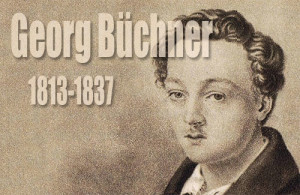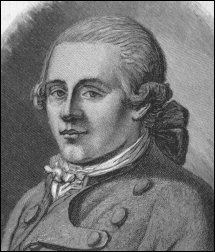The Influence of J.M.R. Lenz’s The Soldiers on Brecht’s Mother Courage and Her Children
[This is the sixth part of a seven part series. Please scroll down to read the five previous installments.]
Character and Events
The plot of The Soldiers is supplemented with a maze of subplots dealing with the collision of military officers with the burgher class of Lille. The main story of Marie’s infatuation with Desportes shows a young woman and her family ruined by their misguided attempt to use marriage to advance socially. Wesener allows his mercantile instincts to get the better of him once he believes that it is possible for his daughter to marry up. Desportes, who uses the appearance of sophistication to mask his predatory and juvenile nature, is a case study of an officer who is marginalized and unsexed in the eyes of society, by the military’s law against soldiers marrying. But it becomes clear that this is not a play that rails against a specific law, as many of the characters seem unaware of the military ban on marriage. The café scenes with the officers feature a theoretical layer, discussions about whether the theater is a bad influence on young people and whether a woman can be robbed of her virtue. Marie’s jilted boyfriend Stolzius moves from his clothier business in Armentières to the officer camp where he seeks revenge for the seduction of his fiancé. One low comic subplot involves juvenile pranks played by the officers on another officer, the lascivious Rammler. Another involves the aristocratic Countess de la Roche’s attempt to sequester Marie at her estate where she will be instructed in “sketching, dancing, and singing.” (p. 39) Through this removal of Marie from society, the Countess intends to restore her good name. In other words she attempts to refit Marie into the artificial ideal of maidenhood satirized by the letter-writing scene that opens the play.
The Countess announces in their first meeting, “I love you, you angel!” and swears to have “the most sincere interest in everything that can possibly affect you.” (p. 37) But in Act IV, Scene Three, at the first sign of trouble, she gives Marie up as a degenerate: “I shall never pardon you when you act against your own best interests. Begone!” (p. 43) The Countess subplot accomplishes two objectives. First, it shows an aristocratic mother figure turning against Marie just as absolutely as Desportes did. For Desportes, Marie goes from “Sublimest object of my chastest passion soaring,” in Act I (p. 14) in the poetry he gave her, to a whore in Act V: “I tell you, she was a whore from the start, and she only took up with me because I gave her presents.” (p. 49) Secondly, the Countess subplot ultimately offers a larger perspective and insight regarding Marie’s fate. After she banishes Marie, the Countess realizes her mistake in trying to isolate the young woman in a protected environment.
What charms does life retain if our imagination does not introduce them? Eating, drinking, occupations without future prospects, without pleasures of our own making, this is naught but death delayed. (p. 43)
This remark may seem like mere rationalization, but it reflects the playwright’s belief in the sacredness of all phenomena and human action. Marie has no choice but to move onward in what Timothy Pope calls “Lenz’s principle of trial-and-error.”1 Lenz’s religious conception of action won’t allow for passivity, for a life of aristocratic leisure. In his essay “On Götz von Berlichingen,” Lenz states a similar insight, regarding human value in terms of action and inaction.
[ . . .] only by action do we come to resemble God who acts without ceasing and without ceasing delights in his works. This is what we learn, that the power of action in us is our spirit, our highest faculty, that it alone gives to our body with all its sensuality and sensitivity true life, true consistency, true worth, that without this spirit all our pleasure, all our feelings, all our knowledge are only passivity, only death delayed.2
For Lenz a passive life is an empty preamble to death, or, as he calls it: “only death delayed.” The Prince in The New Menoza also expresses this important motif: “Mere enjoyment seems to me to be the very sickness from which Europe suffers . . . Action makes us happier than enjoyment. Animals enjoy.”3
In Lenz events define character. The unity of action is replaced with diversity of cause, an assortment of happenings held together by a common subject and theme. Therefore the stature of the characters in Lenz’s drama is much smaller than that of most other dramatic characters of his day, including those in other Sturm und Drang plays. He rejected what Leidner calls “the Titan in extenuating circumstances, or any figure whose acts take on a significance only because they are framed within a compliant text.”4 By featuring characters caught up in the day-by-day melee of existence, by going beyond the idealized middle-class heroes of Diderot and Lessing and other practitioners of the bürglicher Trauerspiele, he anticipated the modern anti-hero. Lenz expresses this approach to putting characters on the stage:
According to my feeling, I appreciate the characteristic, even the caricature, ten times more than the ideal, speaking hyperbolically; for it is ten times harder to depict a figure with the accuracy and truth with which a genius recognizes it than to labor for ten years at an ideal of beauty which, in the final analysis, is only such in the brain of the artist who created it.5
Marie is idealized by her father, her boyfriend Stolzius, and the disingenuous Desportes. But she is not all innocence. Her reactions to events reveal her coquettish deceptions. Yet, as Pope has observed, she is the only character who mentions love as a criteria for a match.6 The Countess ignores Marie’s feelings and fails in her aristocratic gesture of benevolence because of false assumptions. She sees Marie as a type, a social climber who will use her good looks and sex appeal to rise as far as she can. Marie’s actions reveal, however, that she is driven less by the lure of advancement than by puppy love or infatuation. As a jeweler’s daughter and as the child of a man who regards her as a child, she is (like Goethe’s Gretchen) vulnerable to the glittering praise and gifts from an upper class suitor and the fool’s gold promise of love leading to marriage. She is both naïve and manipulative while in pursuit of her false goal. Marie may ply a tragic path, but she is as ordinary as the girl next door.
In the last scene of Act I, Marie convinces her father that Desportes may have good intentions, by showing him the effusive love poetry Desportes has given her, as well as the brooch and a ring with a heart set in stones. Wesener agrees to let Marie see Desportes and go with him to the theatre again as long as they have a chaperon, Madame Weyher. He tells her: “You might end up a real lady yet, you silly child.” (p.15) From these few words can be sensed how unrealistic this vision is, as it is precisely Marie’s immaturity that conflicts with her becoming “a real lady.” Regarding her bourgeois boyfriend Stolzius, the more socially appropriate but less exciting choice of a husband, Wesener says: “You mustn’t scare off Stolzius right away, d’you hear? Now I’ll tell you how to word a letter to him.” (p. 15.) Here his paternal instincts have been swayed by the jeweler’s mercantile instincts and Wesener decides to play a game of chance with his daughter’s fate, gambling with her youth and beauty in the hopes of securing social advancement and the best financial situation for her. Rather than question how she feels about the two men and what her motives for seeming to prefer Desportes are, the role of a wise and sensitive father, Wesener as jeweler holds out for the highest bidder. The father’s misapplied business sense exacerbates the daughter’s inner turmoil.








Recent Comments